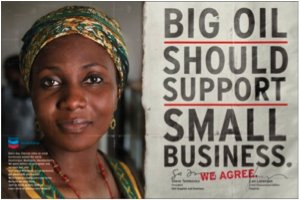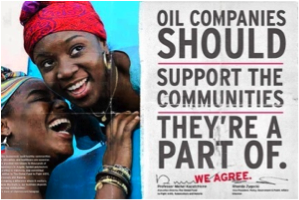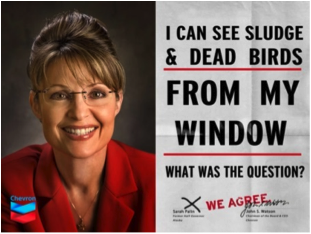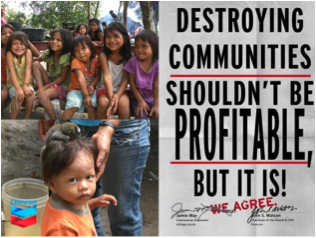Do You Agree? Could You Deliver?
By Bradley Googins & Philip Mirvis
A monthly installment from two of The Lewis Institute’s Social Innovation Fellows: Bradley Googins and Philip Mirvis. The Lewis Institute is proud to give thought leaders, innovators and risk takers in their fields a platform to share their perspective with our community. The opinions expressed here are their own.
Chevron launched its “We Agree” campaign in October, 2010 with the slogan, “It’s Time Oil Companies Get Behind the Development of Renewable Energy.” A series of print and online ads, as well as 30-second YouTube commercials, were posted; these addressed the need for oil companies to support small businesses and communities, to hire local labor, and to put profits to good use, all followed by the statement “We Agree” in bold red type (see above). The company’s “We Agree” website provided details on Chevron’s actions in these regards and invited comments and feedback from the public.
What was behind this campaign? “We hear what people say about oil companies – that they should develop renewables, support communities, create jobs and protect the environment – and the fact is, we agree,” said Rhonda Zygocki, vice president of Policy, Government and Public Affairs at Chevron. “This campaign demonstrates our values as a company and the greater value we provide in meeting the world’s demand for energy. There is a lot of common ground on energy issues if we take the time to find it.”
Now imagine you are an executive of Chevron or one of the other oil majors (or any big global business). Would you understand the meaning behind each of these statements? Would you be prepared to defend company practices on each of these counts? And, most critically, would you have the know-how, experience, and connections to deliver on company commitments to, say, support small business or put profits to good use? Let’s dig into each of these matters.
Supporting Small Business?
When a country exploits its natural resources, such as oil and gas, its currency and exchange rates typically get stronger but its manufacturing sector and exports decline. “Dutch disease” refers to the resulting loss of local business and skilled labor. Is there a remedy? An international NGO, PYXERA Global, brought together BP, ExxonMobil, Chevron, TOTAL, and the Angola state oil company, Sonangol, to create the Centro de Apoio Empresarial (CAE) that provides supplier training and business support to local firms wanting to bid for, and win, contracts with oil companies. To date, over one thousand local companies are registered with CAE and over 10% have completed EHS certification. Chevron recently sponsored a business plan competition for small firms with the winners awarded contracts.
Operating in this kind of milieu, company executives have to work with counterparts in other firms, an international NGO, myriad small, local businesses, plus regional officials and a national government to arrive at agreeable policies and practices. Are you prepared for this?
Supporting Communities?
Chevron has been fighting a lawsuit that Texaco, acquired by Chevron in 2000, dumped more than 18 billion gallons of toxic wastewater into the Ecuadorian Amazon rainforest (from 1964 to 1992), leaving local people suffering from an epidemic of cancers, as well as miscarriages and birth defects. In Ecuador’s courts, some 30,000 indigenous villagers and campesinos were awarded a $9.5 billion judgment in a class action suit after 20 years of legal battles. Chevron thereupon countersued 47 villagers (named as plaintiffs), and New York-based human rights attorney Steven Donziger who had advised them in their winning claim, on grounds of conspiracy to extort the company.
The NGO Amazon Watch presents one side of this story on its website ChevronToxico as do hundreds of other blogs, tweets, and such. Chevron presents its stance on its own website. Again, consider: how should an executive develop a thoughtful stance on whether or not Chevron supports its local communities in a case like this?
Profits to Good Use?
Chevron earned $26.2 billion in profit for 2012. The company paid 19% U.S. taxes last year (half of the top corporate tax rate of 35%), and received an estimated $700 million in annual tax breaks last year. According to filings, Chevron donated $262 million in cash to charity in 2012 or 0.6% of its pretax profits (versus the average for big corporations of 0.8%). In addition, Chevron spent nearly $10 million lobbying Congress in 2012, according to the Center for Responsive Politics. Is this putting profits to good use?
Renewable Energy?
According to industry analyst Antonia Juhasz, BP holds the oil industry record for the highest percentage of expenditures committed to renewables (peaking at 6.5% in 2008 before it sold off its U.S. wind business and some solar operations to help pay for the Gulf cleanup). Chevron and Shell follow at highs of 2.5%, although Chevron’s spending on renewables dropped to 2.3% in 2010 and 1.5% in 2012. On these matters, renewal energy spending isn’t near as profitable as in oil and gas, particularly so with the growth in hydraulic fracturing or fracking as it is known.
BP was the first of the oil majors to promote alternative energy with its “Beyond Petroleum” campaign. But, says another industry watcher Lauren Steffy, “(BP’s) campaign was always more marketing hype than corporate commitment.” This invites counter-measures. Chevron’s “We Agree” campaign was targeted by the activist group The Yes Men which teamed up with the Rainforest Action Network and Amazon Watch to erect a fake website proclaiming that Chevron agrees that oil companies should “fix the problems they create” and “clean up their messes.” These groups then announced an online contest for print, web, and tv ads satirizing what they termed Chevron’s “greenwashing” (see below). Hundreds of submissions poured in and were posted online and even pasted up in cities nationwide. One contestant’s advert read, “Chevron must think we’re stupid!”
A Need for Corporate Diplomacy
The world of Chevron is riddled with complexity. Richard Edelman, president and CEO of the world’s largest public relations firm bearing his name, helps companies to cope with complexity. (His firm monitored reaction to Chevron’s “We Agree” website and campaign.) Edelman points to the need for businesses to engage in “private-sector diplomacy.” He explains, “Private-sector diplomacy bespeaks a different kind of role for business in society…a kind of diplomatic role in speaking to multiple kinds of stakeholders.” He adds, “This is an ongoing conversation. It’s not a transaction only; we also have to be much more transparent about how we’re doing and what we’re doing.”
Speaking of national diplomacy, Winston Churchill once quipped, “Diplomacy is the art of telling people to go to hell in such a way that they ask for directions.” But in today’s environment, no business executive can artfully tell a national government, labor union, global NGO, community activist, media critic, or any other stakeholder “where to go.” On the contrary, corporate diplomacy is all about engagement, two-way conversation, transparency, and hopefully win-win negotiation with a mix of interests.
Are business leaders ready for corporate diplomacy? Richard Haass, President of the Council on Foreign Relations, stresses that this work should not be handled out of “small office” or led by “some vice president for government relations (who) calls a congressional staffer when he’s got an issue.” Instead, he says it is now “intrinsic” to the workings of business and that “every person in the company—certainly the upper echelon of leadership—needs to take this into account….”
John Roos, US Ambassador to Japan, puts the challenge simply: “Diplomacy is fundamentally working with people, bringing people together to deal with difficult issues.” Something we’re betting there will be no shortage of in the new year.




